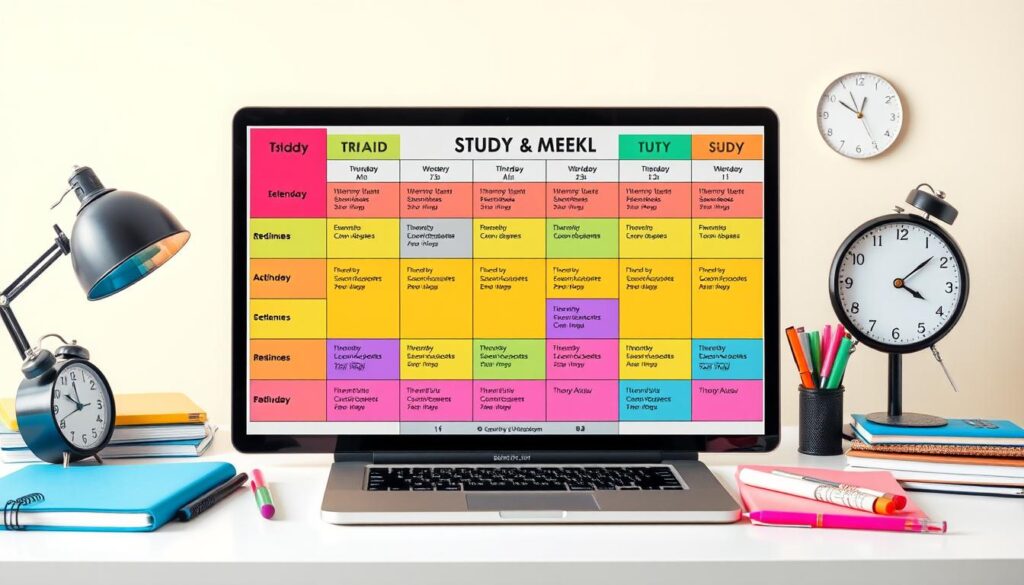Classes, studying, making friends, and relaxing fill up your day fast. If you wish for more hours, this guide has tips for you. It helps you do what you need, have fun, and find time for yourself.
Good time management lets you do more in less time. It helps you focus on what’s most important. Everyone is different, so finding what works for you is key to a better life.
Key Takeaways
- Effective time management allows you to accomplish tasks more quickly and prioritize those that will have the greatest impact.
- Different time management strategies work better for different individuals, so finding the right approach for your needs is crucial.
- Practicing good time management can lead to increased productivity, decreased stress, and more free time.
- Utilizing time management tools and techniques, such as the Pomodoro method or Eisenhower Matrix, can help you stay on track and make the most of your study hours.
- Prioritizing tasks, delegating when possible, and learning to say no can all contribute to better time management.
Manage Your Time with a Comprehensive Calendar
Managing your time well is key to doing well in school. It helps you balance school, friends, and personal life. A good calendar is a must to keep track of deadlines, exams, and social events.
Plan Ahead and Stay Organized
Don’t let important dates catch you off guard. Plan ahead by making a detailed calendar. Include all your deadlines, exams, social events, and other commitments. Keep it somewhere easy to see, like a digital calendar or planner.
With a clear view of your schedule, you can stay organized. This way, you avoid last-minute stress.
Set Reminders to Stay on Track
Knowing your deadlines is one thing, but setting reminders is just as important. Use digital calendar tools like Google Calendar, Outlook, or Fantastical. Set reminders to help you remember important tasks in school and life.
| Time Management Techniques | Benefits |
|---|---|
| Comprehensive Calendar | – Provides a clear overview of upcoming commitments – Helps you stay organized and avoid surprises – Allows for better planning and prioritization |
| Periodic Reminders | – Ensures you don’t overlook important micro-tasks – Keeps you on track with deadlines and commitments – Helps maintain focus and productivity |
Using these time management tips can help you plan ahead, stay organized, and set reminders. This way, you can be more productive and reach your academic goals.
Create a Schedule That Works for You

Your day is special, so make a routine that fits you. First, list your regular things like classes or work. Then, plan your study time, activities, chores, errands, and social plans.
Consider Your Rhythms and Priorities
Notice when you feel most awake and ready to work. Use that time for hard tasks or study. Save the afternoon slump for easy activities, like TV or hanging out with friends.
Understanding your rhythm and focusing on what’s important helps you make a schedule that works. This way, you can maximize your time without feeling overwhelmed.
| Task | Priority Level | Estimated Time |
|---|---|---|
| Attend class | High | 3 hours |
| Complete homework assignment | High | 2 hours |
| Exercise | Medium | 1 hour |
| Grocery shopping | Low | 1 hour |
Make a weekly schedule that matches your personal rhythm and consistent commitments. This way, you can balance your study sessions, extracurriculars, chores, errands, and social engagements better. You’ll avoid the afternoon slump and maximize your time.
Utilize Time Management Tools

Effective time management is key for students. The right tools can make a big difference. Whether you like physical planners or digital tools, finding the right one can help you stay organized and focused.
Physical planners are great for keeping track of big deadlines. They have monthly views and daily sections. This helps you see your schedule and stay on track.
If you prefer digital tools, time management apps like Asana, Trello, and Notion are excellent. They let you prioritize tasks and manage projects. Plus, they’re good for working with others.
The bullet journal method is another good choice. It’s a mix of a notebook and a planner. You can make it your own, track tasks, and build habits.
Finding the best tool for you might take some trial and error. Try out different options like Evernote or Google Calendar. See what works best for you and keeps you productive.
“Spending just 12 minutes planning your day can save up to two hours of wasted time.”
Time Management: Prioritize, Delegate, and Say No

Effective time management is key to balancing your life and keeping your mind healthy. Sometimes, you might feel overwhelmed with too much to do and not enough time. Take a few minutes to evaluate your priorities. Figure out which tasks are most urgent and which take the most energy.
Start with simple tasks to quickly clear your to-do list. This helps you avoid getting stuck early on.
If your schedule is too full, it’s okay to postpone or say no to certain tasks. Your friends and colleagues will get it if you need to reschedule or skip something. Remember, time management is not just about getting work done. It’s also about making time to relax and decompress.
Make Time for Yourself
Always make time for yourself in your schedule. This keeps your mental health and life in balance. Whether it’s daily meditation, a weekly hike, or an hour to read, having things to look forward to is crucial during stressful times.
“The key is not to prioritize what’s on your schedule, but to schedule your priorities.” – Stephen Covey
Collaborate and Seek Accountability
Time management is a team effort. Having accountability partners, study buddies, and roommates can change your academic game. They help keep you on track.
Your academic resource center is a goldmine. It offers guidance and resources for better time management. Don’t be shy to reach out for help.
You’re not alone in managing your time. Working together with your peers can make a big difference. You can share tips, stay accountable, and solve problems together.
Make sure to check in with your study group regularly. Talk about your progress, any challenges, and celebrate your wins. This keeps everyone motivated and helps improve your time management skills.
Being part of a team can really enhance your learning experience. It builds a supportive network, encourages accountability, and opens doors to new achievements.
Be Patient and Flexible

Time management is not a one-size-fits-all approach. It’s a continuous process that needs adaptability and understanding. When building your schedule, it’s key to account for unforeseen circumstances and keep realistic expectations.
No matter how well you plan, unexpected events or tasks will always pop up. Instead of getting upset, be patient and flexible. Add buffer time to your schedule to handle the unexpected.
Also, remember that a rigid schedule might not always be the best. Time management is about finding a balance and giving yourself space for change. Adjust your priorities and strategies as needed to make the most of your time without losing your well-being.
“The secret of getting ahead is getting started. The secret of getting started is breaking your complex overwhelming tasks into small manageable tasks, and then starting on the first one.”
As you work on your time management, be patient with yourself. Embrace the flexibility to adapt to different situations. With a growth mindset, you’ll be ready to overcome obstacles and reach your goals.
Explore Effective Time Management Techniques

Time management is key for students, professionals, and anyone wanting to make the most of their day. Let’s look at four popular techniques to boost your productivity and focus.
The Pomodoro Technique
The Pomodoro Technique is a simple yet effective method. It uses a timer for 25-minute work sessions, called “Pomodoros,” followed by short breaks. This helps creative thinkers and those prone to burnout stay focused and avoid procrastination.
The Eisenhower Matrix
The Eisenhower Matrix is a powerful tool for prioritizing tasks. It categorizes tasks into four quadrants based on urgency and importance. This method is great for leaders and critical thinkers.
Parkinson’s Law
Parkinson’s Law says work expands to fill the time available. This principle helps procrastinators and those who work well under pressure. By setting realistic deadlines, you can avoid letting tasks drag on.
Time Blocking Method
The Time Blocking Method is famously used by Elon Musk. It involves dedicating specific time blocks in your calendar to tasks or projects. This method is great for working students or parents and analytical thinkers, helping them stay focused and avoid distractions.
Exploring these four time management techniques can help you find the best fit for your work style and goals. Whether you’re a busy student, working parent, or driven professional, try these methods to improve your task prioritization, minimize distractions, and boost your productivity.
Also Read : Intensive Study Plans For Exams: Tips For Efficient Learning
Conclusion
Effective time management is key for college students aiming for success. By using the strategies from this guide, you can make the most of your study time. This helps you reach your goals.
Manage your time well, focus on what’s important, and plan for the future. Make promises and stick to your plans. These habits can reduce stress and improve your grades.
Tools like planners and apps can help you stay organized. They keep you on track with your goals. Time management is a skill that grows with practice.
It helps you do more in less time and keeps your life balanced. By mastering time management, you unlock your full potential. This success will follow you beyond college.
FAQs
Q: What are some effective time management skills I can develop for studying?
A: Developing good time management skills involves creating a structured schedule, prioritizing tasks, setting specific goals, and using tools like to-do lists and time tracking apps to stay organized. These techniques help you manage your time effectively and focus on the task at hand.
Q: Why is the importance of time management crucial for students?
A: The importance of time management lies in its ability to help students balance their academic responsibilities with personal life, reduce stress levels, and improve productivity. Good time management skills allow students to allocate their time wisely, ensuring they complete assignments and study efficiently.
Q: How can I overcome procrastination to manage my time better?
A: To overcome procrastination, you can set clear time limits for each task, break tasks into smaller manageable parts, and eliminate distractions. Using a to-do list can also help you prioritize tasks and keep you focused, allowing you to manage your time effectively.
Q: What are some common time management tips for maximizing study hours?
A: Common time management tips include creating a study schedule, setting specific goals for each study session, using time tracking methods to monitor progress, and taking regular breaks to avoid burnout. These strategies can help you spend your time more efficiently.
Q: How does good time management help reduce stress levels?
A: Good time management helps reduce stress levels by allowing you to stay organized and in control of your tasks. When you manage your time effectively, you can complete assignments on schedule and avoid the last-minute rush that often leads to anxiety and stress.
Q: Can you explain the benefits of time management in academic settings?
A: The benefits of time management in academic settings include improved productivity, enhanced focus, better grades, and a more balanced life. By managing your time well, you can allocate adequate time for study, leisure, and rest, leading to better overall well-being.
Q: How can I improve my time management skills for better academic performance?
A: To improve your time management skills, consider implementing strategies such as setting specific and achievable goals, using planners or digital tools for organization, and regularly reviewing your progress. Additionally, practice discipline in adhering to your set schedule to help you manage your time effectively.
Q: What are effective time management strategies for students facing heavy workloads?
A: Effective time management strategies include prioritizing tasks based on deadlines and importance, creating a detailed study plan, using the Pomodoro technique to maintain focus, and regularly reviewing and adjusting your schedule as needed. These strategies help you manage your time more effectively during busy periods.
Q: How can I better manage my time during exam preparation?
A: To better manage your time during exam preparation, start by creating a revision timetable that outlines what you need to study and when. Break down your study material into smaller sections, set specific study goals for each session, and ensure you allocate time for breaks to maintain focus and avoid burnout.
Source Links
- https://www.usa.edu/blog/time-management-techniques/
- https://extension.uga.edu/publications/detail.html?number=C1042&title=time-management-10-strategies-for-better-time-management
- https://www.calendar.com/blog/how-to-use-a-calendar-to-improve-your-time-management-skills/
- https://www.timetackle.com/elevate-your-time-management-7-key-calendar-management-skills/
- https://www.lucidchart.com/blog/time-management-scheduling
